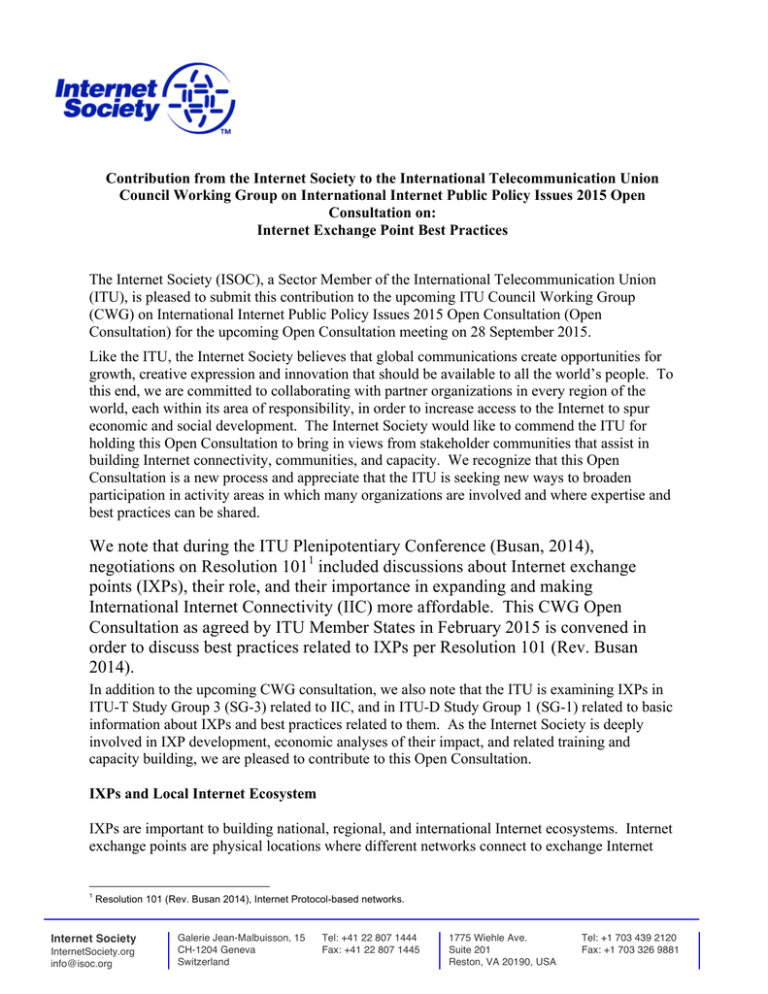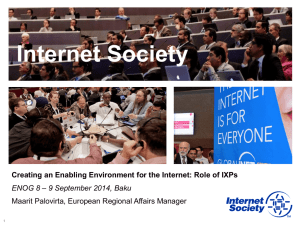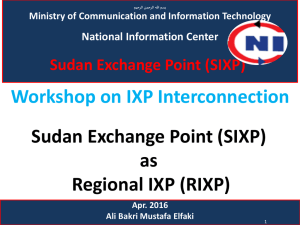Contribution from the Internet Society to the International Telecommunication Union
advertisement

Contribution from the Internet Society to the International Telecommunication Union Council Working Group on International Internet Public Policy Issues 2015 Open Consultation on: Internet Exchange Point Best Practices The Internet Society (ISOC), a Sector Member of the International Telecommunication Union (ITU), is pleased to submit this contribution to the upcoming ITU Council Working Group (CWG) on International Internet Public Policy Issues 2015 Open Consultation (Open Consultation) for the upcoming Open Consultation meeting on 28 September 2015. Like the ITU, the Internet Society believes that global communications create opportunities for growth, creative expression and innovation that should be available to all the world’s people. To this end, we are committed to collaborating with partner organizations in every region of the world, each within its area of responsibility, in order to increase access to the Internet to spur economic and social development. The Internet Society would like to commend the ITU for holding this Open Consultation to bring in views from stakeholder communities that assist in building Internet connectivity, communities, and capacity. We recognize that this Open Consultation is a new process and appreciate that the ITU is seeking new ways to broaden participation in activity areas in which many organizations are involved and where expertise and best practices can be shared. We note that during the ITU Plenipotentiary Conference (Busan, 2014), negotiations on Resolution 1011 included discussions about Internet exchange points (IXPs), their role, and their importance in expanding and making International Internet Connectivity (IIC) more affordable. This CWG Open Consultation as agreed by ITU Member States in February 2015 is convened in order to discuss best practices related to IXPs per Resolution 101 (Rev. Busan 2014). In addition to the upcoming CWG consultation, we also note that the ITU is examining IXPs in ITU-T Study Group 3 (SG-3) related to IIC, and in ITU-D Study Group 1 (SG-1) related to basic information about IXPs and best practices related to them. As the Internet Society is deeply involved in IXP development, economic analyses of their impact, and related training and capacity building, we are pleased to contribute to this Open Consultation. IXPs and Local Internet Ecosystem IXPs are important to building national, regional, and international Internet ecosystems. Internet exchange points are physical locations where different networks connect to exchange Internet 1 Resolution 101 (Rev. Busan 2014), Internet Protocol-based networks. Internet Society InternetSociety.org info@isoc.org Galerie Jean-Malbuisson, 15 CH-1204 Geneva Switzerland Tel: +41 22 807 1444 Fax: +41 22 807 1445 1775 Wiehle Ave. Suite 201 Reston, VA 20190, USA Tel: +1 703 439 2120 Fax: +1 703 326 9881 traffic via common switching infrastructures. They are a key part of a country’s Internet ecosystem, representing a vital way to increase affordability and quality of connectivity. It is critical to remember, however, that IXPs are not a universal solution to a country’s Internet challenges. They complement and improve the functioning of other parts of the local Internet ecosystem by offloading local traffic from congested and more expensive international links, thereby creating opportunities for a competitive environment. Thus, while IXPs are necessary for the development of a robust, cost-effective, and efficient Internet ecosystem in a country, they are not a “magic solution” that can address all challenges. For example, IXPs cannot solve fundamental challenges such as monopolies or lack of competition in international, regional or domestic links, nontransparent regulation, or lack of cross-border connectivity. The presence of an IXP, in conjunction with policy and regulatory reforms in the market, however, can help catalyze significant improvements in a market. IXPs exchange Internet traffic in much the same way that national and regional airport hubs exchange passengers. Airlines exchange domestic passengers at convenient points within the country, rather than exchanging domestic passengers at international airports overseas. Similarly, IXPs route local and regional Internet traffic locally, rather than over international networks. As countries, cities, and towns establish their own IXPs, more local Internet traffic is exchanged and routed locally, thereby reducing costs and network delays, increasing content upload speeds, and encouraging the growth and distribution of local Internet content. Simply put, IXPs help Internet data reach recipients in the same country efficiently and cost effectively. In this submission, we share some key considerations, challenges, guiding principles and best practices for policymakers and other key stakeholders who are developing IXPs. Cost and Network Benefits Generally, IXPs are not expensive to start. The cost of the equipment required to establish an IXP is usually minimal, making start-up affordable. Managing and operating the IXP need not be complex - many IXPs are established on ‘a not for profit basis’, usually staffed by volunteers from their customers. When affordable equipment and this ‘low overhead’ management model is used, experience has shown that ISPs and other network operators can often cover the initial start-up and monthly operating costs relatively quickly. When establishing an IXP, external assistance in the form of setup advice and training may be helpful, especially in the initial phase. There are organizations around the world that provide assistance to new and existing IXPs.2 . IXPs provide important benefits, including lowering Internet-access costs for end users by decreasing operating costs and making Internet access more affordable for a greater number of local Internet users. In addition, IXPs can ensure that traffic between local senders and local recipients use relatively inexpensive local connections, rather than more expensive international links. Efficient interconnection points are created by IXPs as network operators are encouraged to connect in the same location in search of beneficial peering arrangements, cheaper and better traffic exchange, and other value-added services. The presence of an IXP can attract out-ofcountry service operators by providing lower collective access costs to multiple potential local 2 Organizations providing technical and training support to IXPs include: the Internet Society (ISOC), Network Startup Resource Center (www.nsrc.org), Packet Clearing House (www.pch.net), the International Telecommunication Union (www.itu.int), and the African Union Commission (www.au.int). 2 customers. This positions, IXPs as a means to develop a region’s communications infrastructure, including national and international fibre cables, and local datacentre development. IXP’s can be instrumental in developing the local Internet ecosystem, by attracting a range of local and international operators, and triggering innovation and more business opportunities. In addition, IXPs can improve local users’ quality of access by providing more-direct network connections for local content producers and consumers. Operators also have seen improved network management practices as a result of interconnecting at the IXP, resulting in better and improved network efficiencies. Experience shows that access speeds for local content can improve as much as tenfold with an IXP in place because traffic is routed more directly. IXPs can also improve the level of stability and continuity of access—their switching capabilities provide additional flexibility in redirecting Internet traffic when there are connectivity problems. IXPs can also improve a country and region’s overall resiliency in the context of service interruptions that can occur outside their area. Where an upstream service provider experiences an outage, for example when a submarine cable is cut, the stability and continuity of local traffic can be maintained because the IXP can provide additional flexibility in redirecting Internet traffic when these connectivity problems occur. This capability may be of particular value to governments especially in emergency situations. Content Development The benefits of an IXP are not limited to ISPs exchanging their customers’ traffic with each other – they also extend to content providers who can use the IXP to efficiently distribute their traffic to all ISPs in the country. This demonstrably lowers the latency of accessing content, which increases usage, and also lowers the cost for ISPs to access the content. As a result, improvements in access speed facilitated by IXPs often result in incentives for local developers to produce more relevant local content and applications and host it locally. The presence of an IXP may also encourage international content providers to establish themselves in a country. In-country content providers can offer consumers a better online experience because IXPs enable faster content-transmission speeds. Overall, these benefits to local content development and delivery make the Internet more socially and economically beneficial to a country, and assist in long-range connectivity planning as more local-content businesses are developed. Challenges No one organization builds an IXP alone. It takes a local champion and partners to assist in building a community, training experts, and launching a neutral IXP. In fact, most of the time and effort required to set up successful IXPs is spent developing trust, common understanding, and agreements within the local community. Setting up an IXP is “80 percent social engineering and 20 percent technical engineering.” While the benefits of IXPs are clear, there are also practical challenges with respect to organizing and establishing IXPs. 3 > Collaboration and building trust. The establishment of an IXP requires the collaboration of many actors, many of whom are competitors that will be exchanging traffic at the IXP. Some operators might express initial reluctance to collaborate with potential competitors, particularly incumbent operators who often delay or compromise IXP development to protect their dominant position in selling IP transit within the country. Resolving this challenge involves building local Internet communities and trust among participants. > Neutral location and management. Best practices have shown that IXP location and management should be as neutral as possible and agreed upon by all IXP participants. Ideally, the location of an IXP and an IXP manager/operator should be independent of outside commercial or governmental influences. Unfortunately, some incumbents and/or governments want to control all aspects of an IXP. When this happens, the IXP often fails, as confidence and trust in its management and operations is lost. > Enabling environment. IXPs are sensitive to local constraints associated with the lack of an enabling Internet-connectivity environment, including investment and tax constraints, the high cost of local terrestrial fibre, and complicated rules for network deployment. Starting-up IXPs and ensuring their efficient operation is not as simple as it seems, especially in markets where little or no communications liberalization has taken place. Guiding Principles Government actors can play an active and critical role in championing the development of IXPs and removing roadblocks to their growth and success. Guiding principles for policy makers and regulators include: > Support IXPs and speed their development with information and communications technology (ICT) policy objectives that promote an enabling environment for interconnection via policy and regulatory frameworks.3 > Provide as much policy and regulatory transparency as possible to encourage regional and international entities to participate in the local interconnection and peering environment. > Encourage competitive access to wired and wireless connections, which will help lower the costs associated with connecting to an IXP. > Promote local investment opportunities via tax holidays, and reduced duties on the equipment needed to build IXPs and operator networks (e.g., switches, routers, and servers). Provide clear guidance about local business rules and practices. > Foster relationships with IXPs to learn more about local interconnection environments and the sustainability and technical management of an IXP. > 3 Refer to the Internet Society online Interconnection information for a general set of guiding principles that enhance overall network interconnectivity (www.internetsociety.org) and our report on Lifting barriers to Internet development in Africa: suggestions for improving connectivity: http://www.internetsociety.org/doc/lifting-­‐barriers-­‐internet-­‐development-­‐africa-­‐suggestions-­‐improving-­‐ connectivity/ 4 > Work with existing IXPs and expert organizations to avoid the mistakes that other IXPs have made, obtain start-up assistance and equipment donations, and learn more about training and human-capacity development opportunities. Best Practices ISOC has assembled an IXP-development team of employees and associates, composed of former IXP managers and CEOs, network operators, policy-makers and regulators. We work around the world helping develop and level-up IXPs, building IXP communities and human capacity, and publishing studies about IXPs and related Internet ecosystem issues. Below are best practices from some of the practical work we have done with partners around the world: • Local Champion(s): A champion is needed to help develop the IXP and build a community. • Neutrality: As noted above, a neutral location and management of the IXP is critical to sustainability. All organizations at the IXP should agree on location and IXP management. • Simple Management Structure: Many very large IXPs have been established on a basis of a simple management structure, a governing board made up largely of customers, and a volunteer staff, with customer fees set to just cover costs (‘not-for-profit’). • Equal Partners: All peers at an IXP should be treated equally. Founding partners should not vote in or out members or have a weighted vote. • Establish Operating Principles: Establish operating principles and publish them. • Website: It is critical to have a web-site that includes, at a minimum, basic location and contact information, peering policies, traffic statistics, peers at the IXP. • Redundant Power Supply: Always have a redundant power supply and test switching over to it frequently. • Fibre to the IXP: Allow operators to bring their fibre to the IXP • Redundant POP: Establish a redundant Point of Presence (POP). • Numbering Resources: Work with your regional Internet registry (RIR) to obtain IP addresses for peering and IXP management, and obtain and ASN from the RIR. • Host Value-added Services: Host value-added services to increase the value of the IXP for peers (i.e., time servers, root server instances, CDN caches). • Staffing: Some IXPs function with volunteers. Others have part-time or permanent staff. Take a look at models that may work for you, recognizing your staffing may shift as the IXP grows. • Diverse players: Allow diversity at your IXP -- banks, regional and international operators, content delivery networks, research and education networks, cloud-service providers (gaming, social media), government networks. 5 ITU and Global Efforts and Best Practices As the ITU CWG considers contributions from stakeholders, we would suggest that we find synergies between this work and IXP-related activities underway in ITU-D where study group meetings and contributions provide a more in depth opportunity to continue discussions on the topic of IXP Best Practices and related matters. As there is a Study Question in ITU-D SG-1, Question 1/1, that includes discussion on IXP Best Practices, we would suggest that discussions continue in that forum. We also note ongoing work outside the ITU in ISOC, ITU, CITEL, PCH, NSRC, The CTU, Af-IX, APIX, LAC-IX, and Euro-IX to assist in broadening discussions about IXPs and to develop and improve them. Finally, the Internet Governance Forum (IGF) also is working on IXP Best Practices and the upcoming meeting in Joao Pessao, Brazil affords colleagues an additional forum and opportunity to learn more about IXPs. The work being done in the IGF could be a valuable resource for Members who are interested in this topic and could help advance the work underway in ITU-D SG-1 Q1/1. The Internet Society also would like to emphasize that each country has a unique communications environment and that “Best Practices” will need to be tailored to the local context. In short, there is no one-size-fits-all approach and we can expect “Best Practices” to evolve as more countries deploy IXPs and reap the benefits of a collaborative approach. Conclusion Ensuring the presence of a local IXP has become an increasingly important economic priority. By ensuring better and more connectivity—particularly in less-connected areas of a country— IXPs can help develop the local Internet industry, improve competitiveness, and serve as a hub for technical activity. Experience shows that policy makers and other governmental stakeholders are important partners in IXP development. They play a vital role in championing IXPs, encouraging local stakeholders to strengthen the interconnection and peering environment, and promoting stakeholder dialogue and much-needed training. Policy makers who support their local technical community’s efforts to create an IXP are supporting a competitive Internetinterconnection and traffic-exchange environment. The Internet Society thanks the ITU for the opportunity to participate in this Open Consultation and believes that efforts like this to engage a global community of stakeholders is commendable. We look forward to continued collaboration with the ITU and other partners. 6 ANNEX 1 Additional IXP Resources The Internet Society has published a number of papers and additional content related to this issue. These are available for free access on the Internet Society website. > Internet Society: Internet exchange point (IXP) Information Web page, http://www.internetsociety.org/what-­‐we-­‐do/issues/internet-­‐exchange-­‐points-­‐ixps. > The Internet exchange Point (IXP) Toolkit and Best Practices Guide, http://www.internetsociety.org/ixptoolkitguide and www.ixptoolkit.org. Promoting the Use of Internet Exchange Points: A Guide to Policy, Management, and Technical Issues, by Mike Jensen, http://www.isoc.org/educpillar/resources/docs/promote-­‐ixp-­‐guide.pdf > Assessment of the Impact of Internet Exchange Points (IXPs): Empirical Study of Kenya and Nigeria, http://www.internetsociety.org/ixpimpact. > > Connectivity in Latin America and the Caribbean: The Role of Internet Exchange Points, http://www.internetsociety.org/sites/default/files/rpt-­‐LACIXPvrt-­‐201311-­‐eng_0_0.pdf > Lifting barriers to Internet development in Africa: suggestions for improving connectivity, http://www.internetsociety.org/doc/lifting-­‐barriers-­‐internet-­‐development-­‐africa-­‐ suggestions-­‐improving-­‐connectivity/ > Euro-­‐IX Best Current Operational Practices, https://www.euro-­‐ix.net/ixps/set-­‐up-­‐ ixp/ixp-­‐bcops/ Report from the IGF Rio Best Practices Session Internet Traffic Exchange in Less Developed Internet Markets and the Role of Internet Exchange Points, http://www.isoc.org/educpillar/resources/docs/igf-­‐ixp-­‐report-­‐2007.pdf > Towards Efficiencies in Canadian Internet Traffic Exchange, http://cira.ca/sites/default/files/attachments/publications/toward-­‐efficiencies-­‐in-­‐ canadian-­‐internet-­‐traffic-­‐exchange.pdf > OECD’s report on Internet Traffic Exchange, http://www.oecd-­‐ilibrary.org/science-­‐and-­‐technology/internet-­‐traffic-­‐ exchange_5k918gpt130q-­‐en > 7


